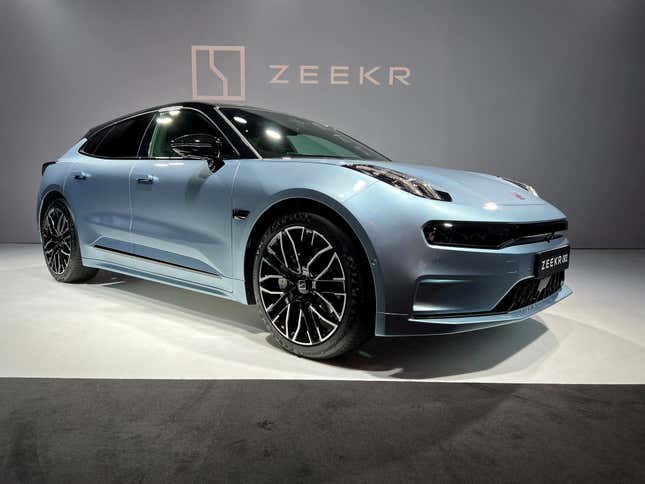
Good morning, Quartz readers!
Here’s what you need to know
Chinese premium electric car brand Zeekr made its US IPO paperwork public. The Geely-owned brand had aimed to raise more than $1 billion, but that’s looking unlikely.
Israel agreed to four-hour pauses of fighting in Gaza, the US said. The daily humanitarian stoppages will allow civilians to flee, and they come as hostages are still being held by Hamas.
Jerome Powell said inflation has given the US economy “a few head fakes.” The US Federal Reserve chair signaled that its cautious approach to interest rates will continue, and didn’t rule out future hikes.
Amazon took another shot at healthcare. The company is offering Prime members $9 monthly virtual access to One Medical providers at any time, but in-person visits will cost more.
Growing colors can help the environment

There’s a process that consumes 1.3 trillion gallons of water every year—the equivalent of two million Olympic-sized swimming pools—and it’s the reason your jeans are blue.
That process is fabric dyeing. While recent shifts have been made in the fashion industry to swap synthetic dyes for more natural ones, chemicals are still needed to bind those colors to fabric. A UK-based company called Colorifix is changing that, and has developed a DNA sequencing process that derives microorganisms that produce pigments, through a fermentation process similar to making beer. The best part, outside of the pretty hues? It takes chemicals completely out of the fabric dyeing equation.
Clarisa Diaz explains how fashion suppliers can use microorganisms on-site to grow sustainable blues, pinks, and peaches. Read the full story.
Oil drilling can’t help the environment, but Shell wants protestors to back off
At the beginning of this year, six Greenpeace activists boarded and occupied a 34,000-ton Shell oil rig to protest drilling. They climbed aboard off the coast of the Canary Islands and traveled almost 4,000 km (2,485 miles) to Norway.
At the time of the protest, Shell and its co-claimant, platform builder Fluor, said they would seek damages upward of $120,000—an amount Shell can make in “less than two seconds,” Greenpeace said.
Shell later upped its claim closer to $8.6 million to include shipping delays and other fees, and now it’s ready to come to an agreement somewhere closer to $1.4 million. But there’s a stipulation: It’ll only give Greenpeace a $6.6 million break if the advocacy group promises to stop protesting on Shell property—forever.
Hollywood strikes in 2023, by the digits
Hollywood is back in business. A tentative agreement between the Screen Actors Guild and the American Federation of Television and Radio Artists and the Alliance of Motion Picture and Television Producers ends a stalemate in the industry, and outside of minimum wage hikes and streaming residuals, sets up some new rules around the use of artificial intelligence.
Here’s some of the highlights, by the numbers:
$1 billion+: Value of the SAG-AFTRA’s new three-year contract
$6.5 billion: Cost of both Hollywood writers and actors strikes to California’s economy
2%: Cut of streaming revenue SAG-AFTRA was demanding
63 years: How long ago the last twin Hollywood strikes—of writers and actors—took place
Quartz’s most popular
🎥 A snapshot of AMC’s latest earnings
🎤 Taylor Swift and BTS superfans are rallying against Argentina’s far right
👎 Things really didn’t work out for WeWork
🛰️ The US restricts sales of satellite images over just one state—Israel
🔌 Who are the last remaining holdouts on Tesla’s charging standard?
🍎 Is it too late to buy Apple stock?
Surprising discoveries
If you’re willing to watch holiday movies for 25 nights, there could be a cash prize in it for you. To each their own!
Lice are the key to a lot of the secrets of human history. Well they’re one key anyway—a tiny, disgusting key.
Restaurant chains are hoping more salads on the menu will lure Ozempic-takers. They’re placing their bets on the studies that show cravings tend to be along the lines of fruits and vegetables.
AI will maybe make animated films a lot cheaper to make. So says DreamWorks’ Jeffrey Katzenberg, but whether that’s a good thing or a bad thing isn’t really clear.
Camps teaching kids how to be YouTubers are a thing. They say it’s just for fun, but kids know it’s all about making that money.
Did you know we have two premium weekend emails, too? One gives you analysis on the week’s news, and one provides the best reads from Quartz and elsewhere to get your week started right. You can get those by becoming a member—and take 20% off!
Our best wishes for a productive day. Send any news, comments, homes alone, and holidays on lice to talk@qz.com. Today’s Daily Brief was brought to you by Morgan Haefner and Susan Howson.